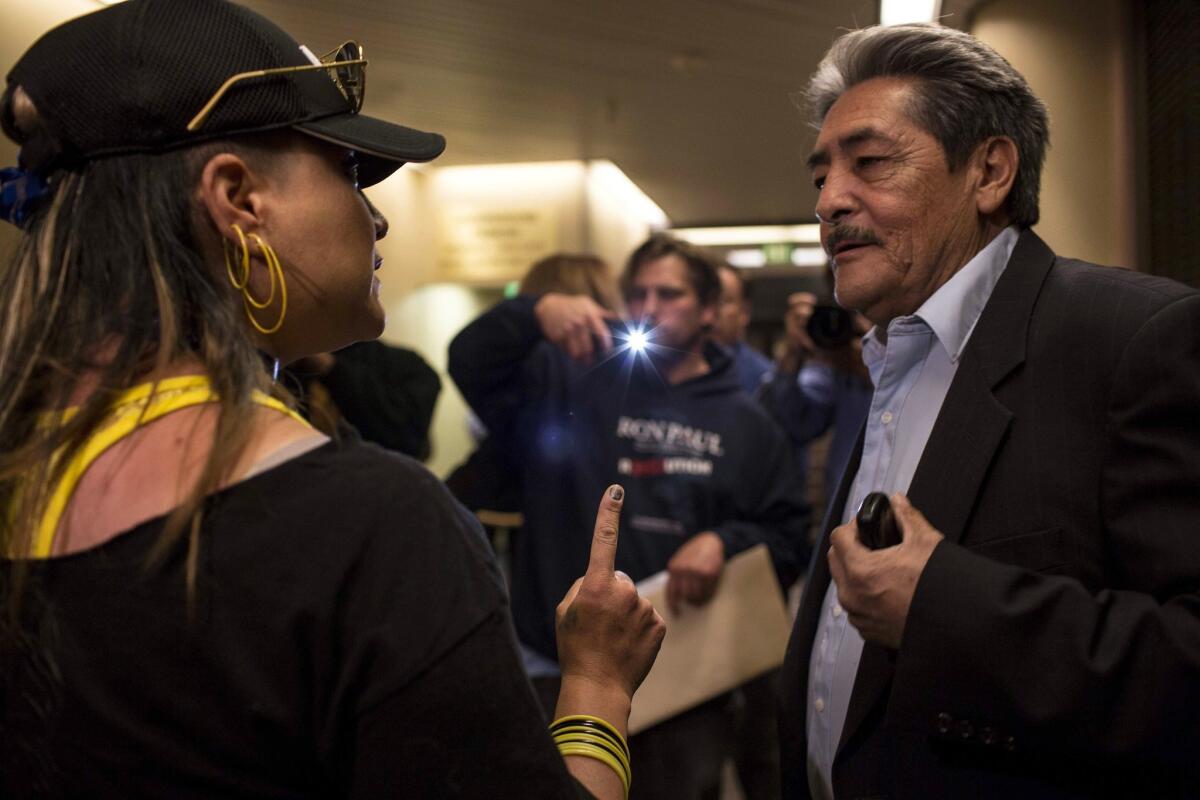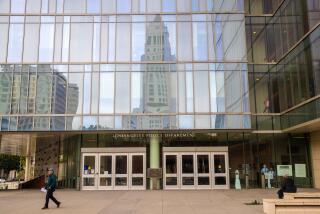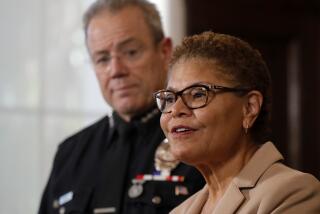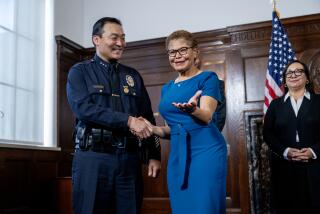Albuquerque City Council to reconsider method of choosing police chief

Weeks of protests against deadly police shootings culminated Thursday night in the City Council’s decision to discuss changing the way the police chief is selected.
Currently, he is picked by the mayor. Chief Gorden Eden Jr. was appointed by Mayor Richard J. Berry in February.
One proposal on the agenda would amend the city charter to require council approval of the mayor’s choice. A competing proposal would make the police chief an elective office.
The council had intended to consider the issue Monday, but adjourned early when protesters took over the meeting — sitting in council members’ chairs and even eating their Girl Scout cookies.
That behavior, one supporter warned, may have been counterproductive.
Before Thursday’s session, City Councilor Klarissa J. Peña called Monday’s protests an “unfortunate turn of events.” Although she empathized with the activists, she said, they may have damaged their cause.
“They were not there to harm anybody,” she said. “They just wanted their voices heard. The unfortunate thing was that there were other people who wanted their voices heard as well, and they got drowned out or left out, and I think we have to be fair to everyone.”
As Thursday’s meeting opened, Council President Ken Sanchez warned audience members that they would be evicted if they misbehaved. “If we don’t have order tonight, I will clear the room,” he said. “Please be respectful.”
Police behavior, and the police chief, have become points of focus in the wake of the deadly shootings by officers and a U.S. Justice Department report released last month that criticized the department for a culture of “aggression” that, it said, had led to a series of unjustified shootings.
Federal investigators found that Albuquerque police too often used lethal force when there was no imminent threat of death or seriously bodily harm to themselves or others. Another key finding was that a significant amount of use-of-force cases involved people with mental illness.
Thursday’s council meeting came less than a week after the latest officer-involved shooting. Armand Martin, 50, was killed Saturday after threatening his wife and children. Police said they fired as he brandished two handguns and appeared to be threatening. They have released video of Martin dead on the ground, but not of the shooting. Activists have demanded to see more, but it is unclear whether the shooting is on police video.
In the audience, protesters wore red to symbolize the blood of the 25 people police have shot to death since 2010. They sat in seats where Albuquerque police brass and city staff usually sit. Security officers kept a close watch on the group.
Officials warned that rules of decorum would be strictly enforced. No disruptive public outbursts, props or signs would be allowed, officials said, except signs that could be displayed on an overhead projector during presentations. Violators would get one warning. After that, those who failed to comply could be cited, which could result in a fine of $500 and 90 days in jail.
The first member of the public at the lectern had signed up to speak on a minimum wage ordinance. Wearing a red shirt, Silvio Dell’Angela stood silently for more than a minute as, on an overhead projector, he displayed a statement saying he was “outraged” that the council’s new rules curtailed the public’s right to “protest peacefully.”
One of his neighbors was fatally shot by Albuquerque police in 2010.
As a security officer came to escort him away from the lectern, Dell’Angela said, “I still have 36 seconds.”
Later, when the police issue came up for public comment, at least seven speakers followed his example. One woman turned her back on the council and raised her fists until security took her away.
Mike Gomez, whose son Alan was killed by police, followed her to the lectern. He put his son’s picture on the overhead projector and said, “I love you. I miss you a lot.” Then he turned his back.
When asked to address the council, he said, “You’re not worth addressing.” He added, “Blood is on your hands. ... [Born] April 25, 1989, and died May 10, 2011,” and he raised his fists.
“Silence is speech,” some members of the audience shouted. Others put their fists up in the air as security escorted Gomez out.
The hearing was expected to last late into the night. Although the proposals were introduced late Thursday, they require a second reading before the council can vote on them.
More to Read
Start your day right
Sign up for Essential California for news, features and recommendations from the L.A. Times and beyond in your inbox six days a week.
You may occasionally receive promotional content from the Los Angeles Times.







